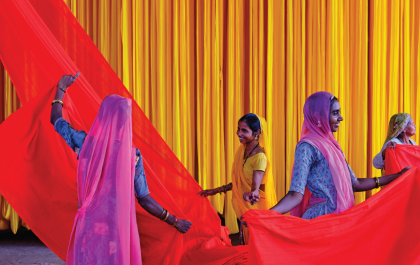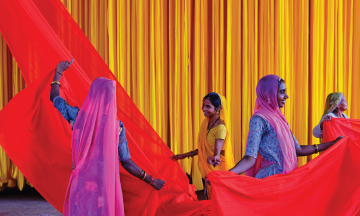As temperatures rise, things are only going to get worse. But we can all work together to change that
By Raida AK Reza
Growing up, I was told that there are six seasons in Bangladesh – summer (grissho), rainy (borsha), autumn (shorot), late autumn (hemonto), winter (sheet), and spring (boshonto). As I grew up, I remember the seasons turn from tepid to warm to rainy to windy and finally cold. With all the seasons came all its charming qualities. New leaves and flowers in spring, incredible fruits in summer, a sea of kash phool in autumn, the chilly winds of late autumn which would bring in the heavy fog of winter. Observing the changes in seasons was an enchanting experience. One, that is in the rearview of my memories.
For the past decade, I can barely remember any shifts in season, it has been “hot,” “extremely hot,” “oh my God I am dying, it is so hot,” “oh it is raining and flooding?” to “oh, hey, it’s kind of cold now.”
Correspondingly, according to the World Meteorological Organization, July 2023 was set to be the hottest month on record. In June 2023, UN Secretary General Antonio Guterres warned the world that “the era of global warming has ended; the era of global boiling has arrived.” He also added: “For vast parts of North America, Asia, Africa, and Europe – it is a cruel summer. For the entire planet, it is a disaster. And for scientists, it is unequivocal – humans are to blame. All this is entirely consistent with predictions and repeated warnings. The only surprise is the speed of the change.”
The speed of the change is indeed surprising and somewhat seems sudden, even though we have been getting all these predictions from the entire scientific community for decades.
When I first read this, I imagined that metaphor we always hear about. Of that frog who is in the boiling pan. The frog is comfortable, even when the flame rises. The frog is boiling and realizes that it is too late. We are, dear reader, that frog. We are and have been accepting that change in seasons do not bother us. We have been accepting that the rise in heat, the extreme weather events, the death toll, they are all something that does not bother us. We are pacified, and we have started to boil.

Since July, it felt like everyone in Dhaka was sick. Dengue is at an all-time high, with people being hospitalized left to right. To note, dengue’s main vector, the aedes aegypti mosquito, thrives at temperatures around 30 degrees Celsius and in humid conditions, which have become more frequent in the past few years as a result of these record heat and extreme weather events. The heat is making us sicker. It is undeniable.
Climate change’s effect for Bangladesh was always supposed to be higher than other countries. Bangladesh is one of the lowest carbon emitting countries and is the world’s seventh most climate risk-affected country. For Bangladesh to adapt to the disastrous effects of climate change, Bangladesh needs to strive to improve health, as well as the quality of air and water, and to access cleaner, more efficient technologies that support development. There is not only one “carbon” solution to our problems. Low carbon economy is important, but so is improved water quality. Renewable energy is important, but so is energy efficiency on traditional fossil-based operations.
There are methods to curb effects of extreme heat in cities such as Dhaka. These include green technologies, such as planting more trees and developing urban gardens to offset the heat produced by concrete structures. Buildings equipped with cool roofs, green roofs, and energy-efficient air conditioning systems are also valuable solutions. Developing more parks and recreational areas can allow people to escape the heat and stay cool. Awareness campaigns can help to educate people about staying hydrated, protecting themselves from the sun, and recognizing the signs of heat-related illnesses.
As an individual, you can strive to increase the green space you have. Try implementing a rooftop garden, or a humble garden in your verandah. Encourage your neighbors and your building’s manager to add more green spaces to parking areas, and in areas in front of the house. These spaces provide shade and help cool the surrounding environment. Additionally, implementing water management strategies can help mitigate heat-related issues. This includes promoting rainwater harvesting, constructing water bodies or fountains, and creating water sprays or misting stations.
Finally, raising awareness and educating the public about the risks and impacts of extreme heat is crucial. This can include providing information on heat safety measures, promoting hydration, and encouraging people to stay indoors during the hottest parts of the day. But it is very important to note that these strategies require a holistic and integrated approach involving government authorities, urban planners, and community participation to effectively address the challenges of extreme heat in urban dense areas like Dhaka.
I have a theory. People get angrier when it’s hotter. If you’re angry, please use it to advocate for a positive change. It is truly the time to enact action. We cannot be in the pan anymore. We need to leap out and drive change.
Raida AK Reza is a resource efficiency specialist and works towards decarbonization. She dreams of a carbon neutral world where effects of climate change have been curbed. She is also the founder of Zero Waste Bangladesh.













